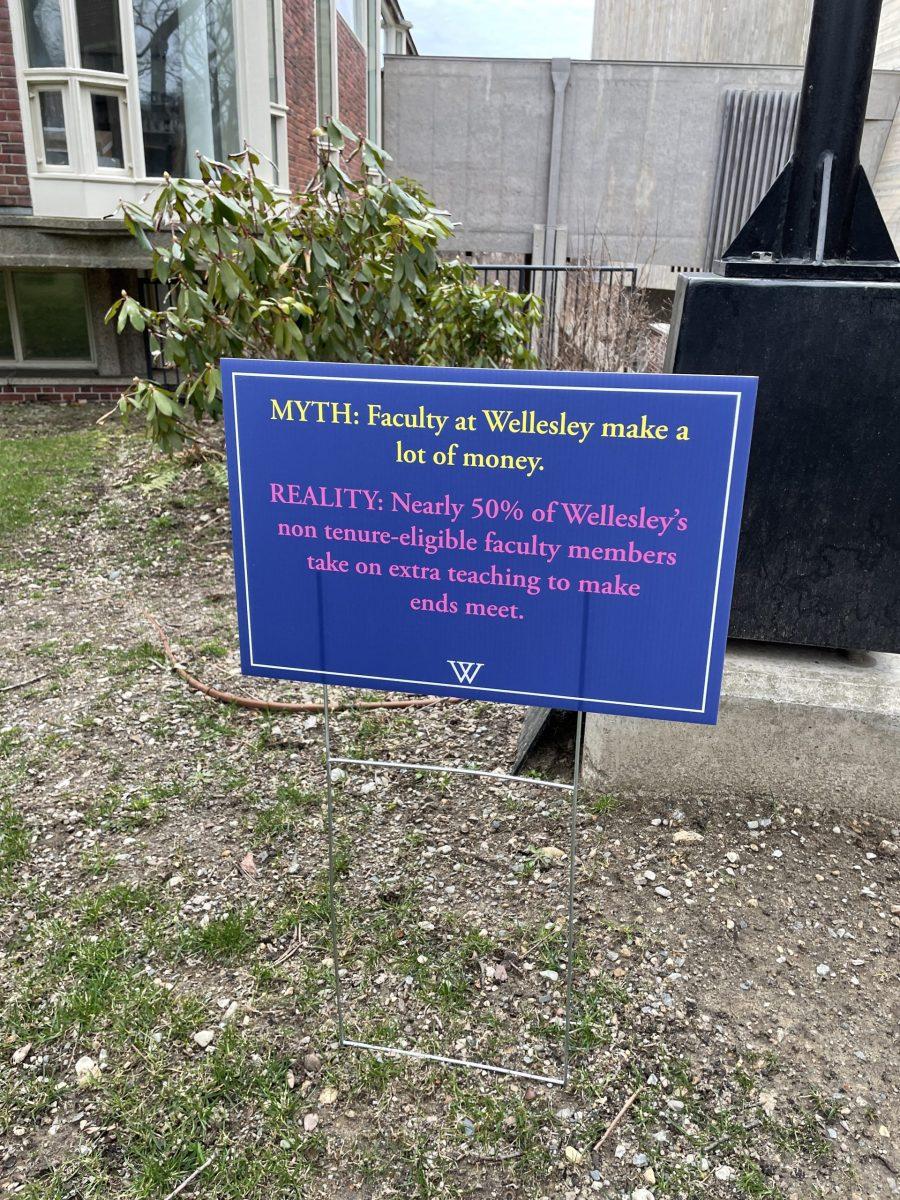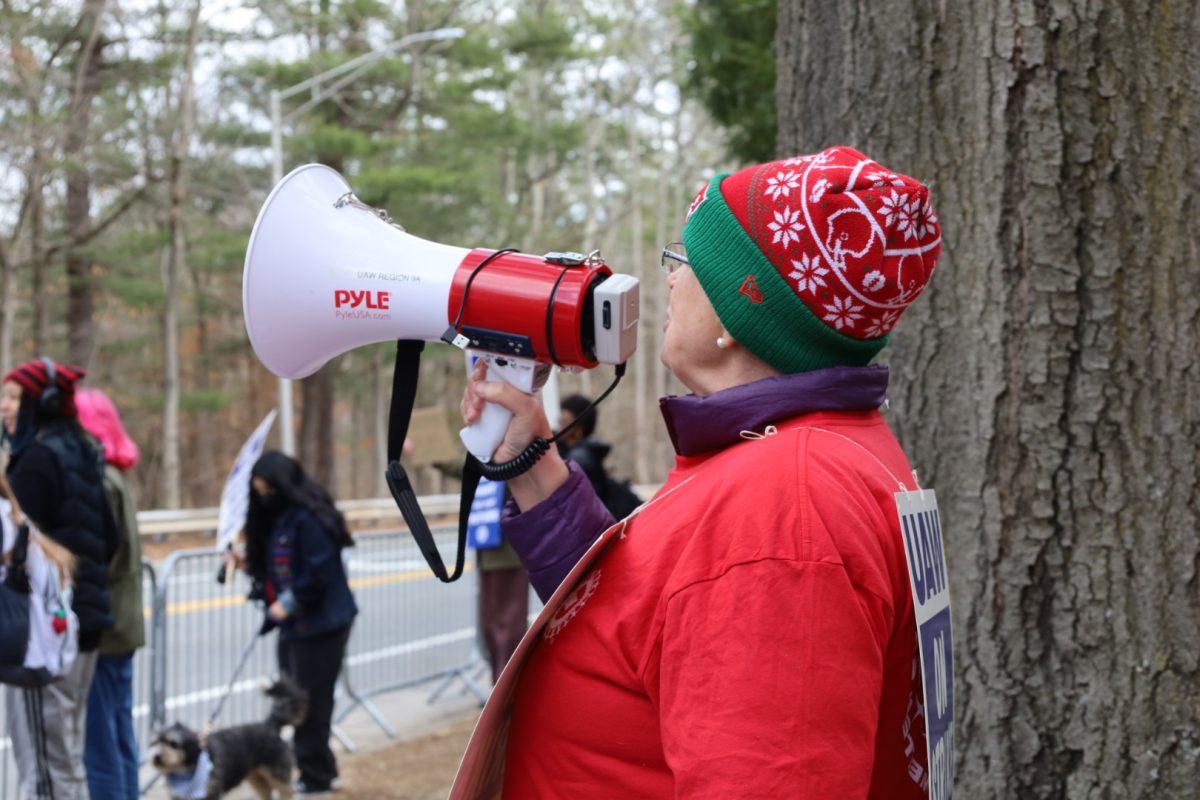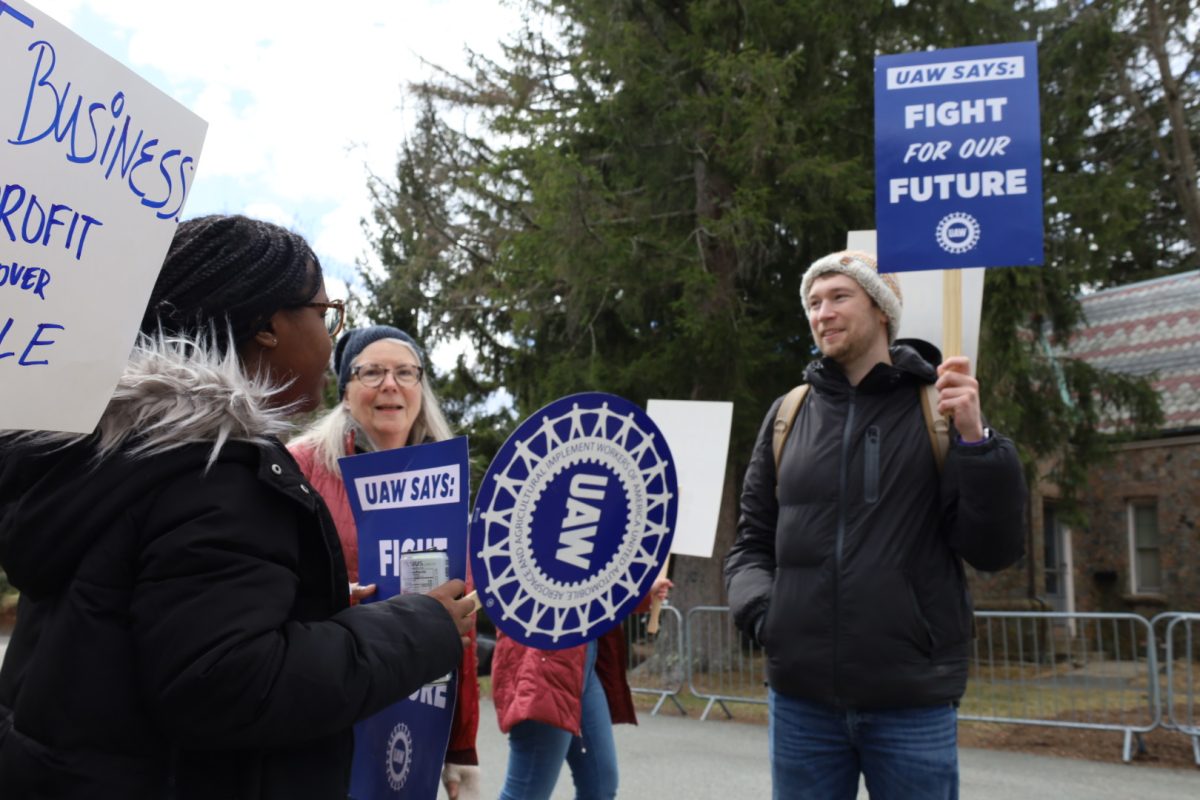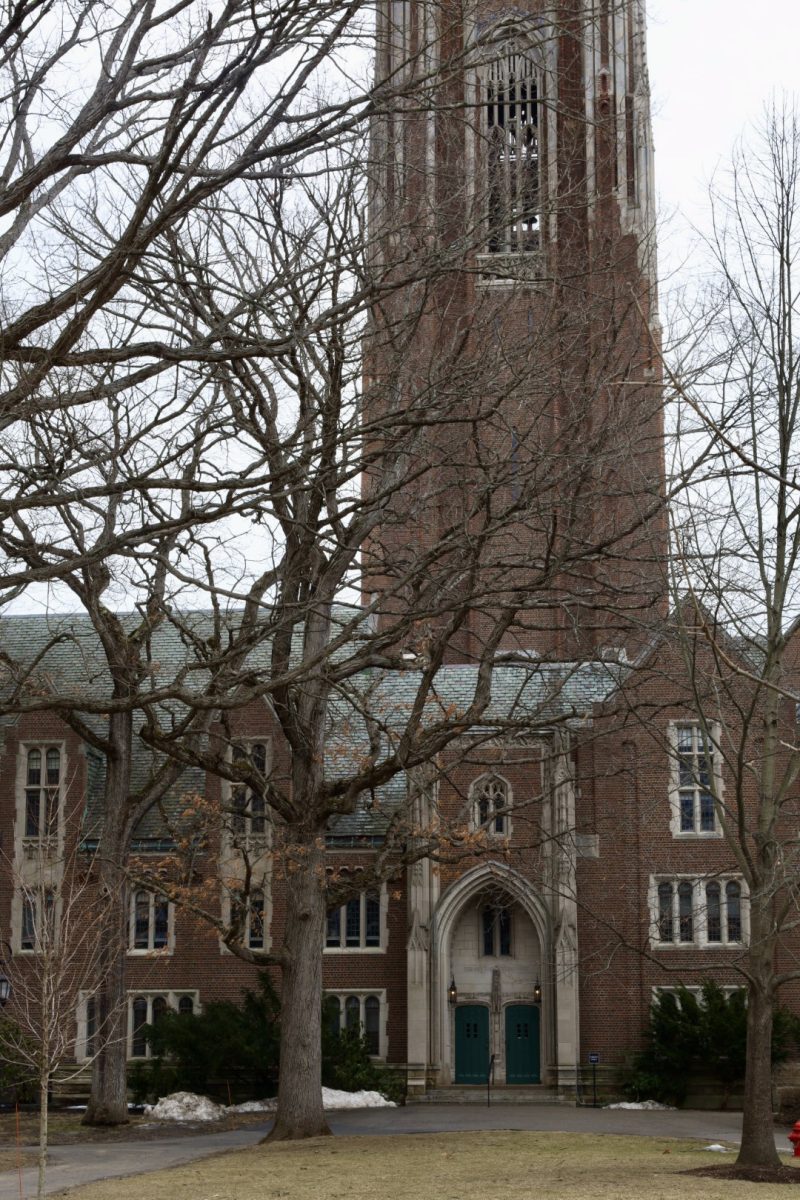The precarious nature of a non-tenure track position keeps Professor Erin Battat up at night. Although originally in a tenure track position at Pennsylvania State Harrisburg, Professor Battat moved to a non-tenure track job at Wellesley after her husband accepted a tenure track position at the College. Though her initial choice was simple, the cost of the position eventually became too high.
“That was just a brutal experience for us, personally,” Professor Battat said, pointing to early morning daycare drop-offs, long train rides and not being able to come home until midnight.
Professor Battat initially accepted a position at Harvard as a temporary lecturer, before accepting a position in the writing department at Wellesley. The non-tenure track position at Wellesley was supposed to be temporary — until she fell in love with teaching and spent her last six years as a professor in Wellesley’s writing department.
“I made a choice that had financial consequences,” Professor Battat said, adding that she was aware she would receive a decrease in pay in a non-tenure position. “[There were] ways in which my choices were constrained, not only by a job market that does not sustain families or partnerships … [but by] gendered expectations for caregiving really shaped my choices.”
For Professor Battat, the choice was worth it. However, the low pay and lack of job security for non-tenure track faculty at Wellesley has left her in a difficult position.
Not only does a tenure track position not guarantee job security, but besides a one-time adjustment in 2020, the salary of non-tenure track faculty has not increased since 2008. According to The $60,600 salary for a professor with a family of four qualifies a visiting lecturer for low income housing assistance in Massachusetts (with the limit being $66,150). According to a survey of non-tenure track faculty conducted by Wellesley’s branch of the American Association of University Professors (AAUP), the majority of non-tenure track faculty members reported salary as the “greatest area of dissatisfaction in their work at the College.”
AAUP is an advocacy organization that represents the needs of faculty across the US. Its three mandates are academic freedom, advancements in shared governance and promotion of economic security. An internal survey conducted by the AAUP showed that the majority of members were concerned with the last tenet of the organization’s mission, specifically in the context of non-tenure track professors.
Professor Battat serves as co-president of Wellesley’s chapter of the AAUP with Professor of Peace and Justice Studies Catia Confortini. In response to member concern with salary equity, Professors Battat and Confortini have focused the efforts of the organization to support the work of non-tenure track faculty. Both also added that issues of under-compensation were extended to staff across all departments as well.
AAUP is not the first organization on campus to represent non-tenure track faculty. The Faculty on Term Appointments, Instructors in Science Laboratory, and Physical Education, Recreation and Athletics Faculty Advisory Committee (FIPAC) in Academic Council is made up of six faculty members that represent their interests in Academic Council. Since it is an advisory committee, however, it does not make any decisions on policy, and works instead to advise senior leadership on policies regarding non-tenure track faculty.
“FIPAC has always worked within the governance structure of the College. It became clear that going through official channels and continuing to work through committees became insufficient,” Professor Confortini said, adding that that is where AAUP comes in. “The idea is that there needs to be some advocacy and some pushing from outside because otherwise the wheels of official channels are slow and insufficient. We need some other organization from the outside that pushes for senior leadership to do the right thing that needs to be done.”
As part of the recent advocacy work, AAUP assisted with planning the Teach In. The purpose of the event was to raise consciousness about the issues faced by non-tenure track faculty through a community focused, rather than public facing, event. AAUP also worked with Wellesley Against Mass Incarceration (WAMI).
The event was held on April 7 from 12:45 to 2:00 p.m. in Clapp Library and on Zoom. Professor Battat spoke at the beginning and was followed by about five other professors who shared their experience as non-tenure track faculty members.
Professor Stella Kakavouli of the computer science department spoke about her experience as a faculty member for 21 years, having only received one minor increase in her salary. According to Kakavouli, the starting salary of the students she teaches is 30% more than the salary she receives as a member of the faculty for 21 years.
“I can’t help feeling a little underappreciated,” she said.
During the event, professors spoke about the gender inequities of lower paid non-tenure tracks offered by the College. According to Professor Battat, 71% of non-tenure track faculty at Wellesley identify as female, compared to 57% of tenure-eligible faculty. Professor Battat believes that one reason why non-tenure track faculty are less valued by the College and colleges across the country, was because they tend to be more teaching oriented. Compared to research, teaching was historically “women’s work.”
“Women often have to or are pressured to make painful career choices and sacrifice career for caregiving obligations,” Professor Battat said. “Given gendered expectations for caregiving in our society, it’s women who are the ones who make those difficult choices.”
According to Professors Confortini and Battat, they have not yet received a response to the teach-in form administration, even though members of upper administration were invited to the event. While Provost Andrew Shennan sent out an email to faculty and staff regarding concerns raised by non-tenure track faculty, he did not address the teach-in in particular. Both professors added that administration has not reached out to AAUP directory.
“At nearly every level of the College, Wellesley employs more women than men, including tenured professors and non-tenure track faculty. We strive to promote gender equity in both pay and positions across the institution, with differences based on years of service and experience. Currently, for example, more than 25 non-tenure-track faculty members, 76% of whom are women, earn more than the full-time equivalent of $100,000 a year,” Provost Shennan wrote in his email.
The provost also added that “the College has embraced important changes to integrate FIP faculty into our governance and appointments structures.” He pointed to the 9% raise in 2020 and the “all non-tenure-track faculty will receive the recently announced salary increases of 5% for faculty and administrative staff for the next academic year and additional contributions to 403(b) plans.” Provost Shennan added that his office was adjusting the overload compensation rate for courses and labs taught by tenured, tenure-track and FIP faculty.
According to Professor Confortini, AAUP is waiting to discuss its next steps with its members before figuring out other advocacy avenues.
“I hope that Wellesley will do the right thing, but if public pressure is what is needed, then that’s the step we’ll take,” Professor Battat said.
According to Hannah Grimmett ’25, the leader of WAMI’s Labor Advocacy Task Force, the faculty involved in the teach-in collaborated with the organization to tell students about the event.
“[WAMI] designed the spam, we hung it up around campus. We did a lot of the legwork with promoting [the event], putting the lawn signs up that you’ll see around campus,” she said. “We also helped with the funding for some of those signs because as faculty they don’t have funding in the same way that our organization would. They also don’t really have access to a social media presence in the same way that we do as a student organization.”
WAMI became involved in the teach-in as an event in their Union and Labor Advocacy challenge, a month-long educational event on worker’s rights. Grimmett was reaching out to the staff union on campus, the Independent Maintenance and Service Employees of America, and in trying to focus on campus-specific issues, happened to speak to a professor who was involved in the organization of the teach-in. Grimmett viewed the issue of low and stagnant wages as a system issue.
“I would really implore students to view the inequalities that both groups experience, rather than as two separate issues, as one systemic issue of Wellesley College employees across the spectrum of employment being underpaid and undervalued for their labor,” she said.
Quinn Etoll ’23, an attendee of the teach-in via Zoom, was struck by how the faculty reported feeling undervalued.
“The Wellesley administration claims to put a high value on our education,” she said. “The reality of the situation [that] we’re not properly valuing people who do the actual providing of our education is egregious.”
Grimmett was overall hopeful due to the turnout at the event, but did acknowledge that there was a significant challenge to keeping this energy sustained.
“The really striking thing to me has been that there have been students that came before us who were aware of these kinds of issues, if not specifically non-tenure track faculty issues, then it was other labor issues on campus,” she said. “They would make noise about it and they would say this is wrong, and something needs to be done. But after those students are gone, the next wave of students just doesn’t know that those problems were ever even there to begin with. I think that it’s just really important that we try to really maintain this momentum.”
Grimmett believed that student awareness and advocacy was crucial to push administration to make non-tenure faculty conditions better.
“I think the most important thing that students can do right now is to continue staying aware of this issue, educating themselves, and just making it clear that their support is there,” she said. “The most important thing that students can do is really show administration that this is an issue that they deeply care about, and that we as the students of Wellesley College are very upset to see our professors being undervalued for all of the work and mentorship that they have provided.”






